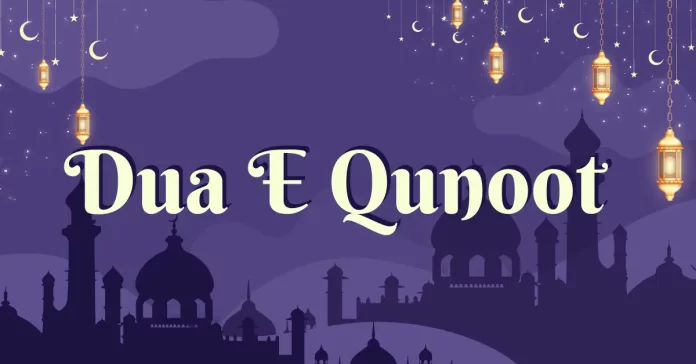Introduction
In the rich tapestry of Islamic prayers, Dua e Qunoot stands as a powerful supplication, cherished by believers for its profound significance and spiritual impact. Rooted in the tradition of Prophet Muhammad (peace be upon him), this prayer holds a special place in the hearts of Muslims worldwide. Join me on a journey to explore the depths of Dua e Qunoot, unraveling its meaning, significance, and transformative power.
Understanding the Essence of Dua e Qunoot
Dua e Qunoot, often recited during the Witr prayer, embodies a deep connection between the believer and the Divine. At its core, it is a heartfelt plea for mercy, guidance, and protection from Allah (SWT). Understanding its essence requires delving into its linguistic and spiritual dimensions.
The Linguistic Insight into Dua
Derived from the Arabic root word “Qa-Na-Ta,” which means obedience, humility, and devotion, Dua e Qunoot exemplifies the essence of submission to the will of Allah (SWT). It signifies a profound acknowledgment of human dependency on the Creator and a humble surrender to His wisdom and mercy.
How to recite Dua E Qunoot
اَللَّهُمَّ إنا نَسْتَعِينُكَ وَنَسْتَغْفِرُكَ وَنُؤْمِنُ بِكَ وَنَتَوَكَّلُ عَلَيْكَ وَنُثْنِئْ عَلَيْكَ الخَيْرَ وَنَشْكُرُكَ وَلَا نَكْفُرُكَ وَنَخْلَعُ وَنَتْرُكُ مَنْ ئَّفْجُرُكَ اَللَّهُمَّ إِيَّاكَ نَعْبُدُ وَلَكَ نُصَلِّئ وَنَسْجُدُ وَإِلَيْكَ نَسْعأئ وَنَحْفِدُ وَنَرْجُو رَحْمَتَكَ وَنَخْشآئ عَذَابَكَ إِنَّ عَذَابَكَ بِالكُفَّارِ مُلْحَقٌ
Transliteration
Allahumma inna nasta-eenoka wa nastaghfiruka wa nu’minu bika wa natawakkalu alaika wa nusni alaikal khair, wa nashkuruka wala nakfuruka wa nakhla-oo wa natruku mai yafjuruka, Allah humma iyyaka na’budu wa laka nusalli wa nasjud wa ilaika nas aaa wa nahfizu wa narju rahma taka wa nakhshaa azaabaka inna azaabaka bil kuffari mulhik
Meaning
O Allah! We invoke you for help, and beg for forgiveness, and we believe in you and have trust in you and we praise you, in the best way we can; and we thank you and we are not ungrateful to you, and we forsake and turn away from the one who disobeys you. O Allah! We worship you and prostrate ourselves before you, and we hasten towards you and serve you, and we hope to receive your mercy and we dread your torment. Surely, the disbelievers shall incur your torment.
The Spiritual Significance of Dua
Beyond its linguistic nuances, This Dua holds immense spiritual significance in Islam. It serves as a potent reminder of the believer’s unwavering trust in Allah’s (SWT) benevolence and His ability to alleviate trials and tribulations. Through this supplication, Muslims seek divine intervention in times of distress, seeking solace and guidance in the face of adversity.
The Methodology of Reciting Dua
Reciting Dua e Qunoot requires adherence to specific etiquettes and methodologies prescribed by Prophet Muhammad (peace be upon him). It is typically performed during the Witr prayer, following the completion of the second rakah. The supplication can be recited in various postures, including standing, bowing, or prostration, symbolizing the humility and sincerity of the believer’s plea.
Unlocking the Benefits of Dua
The benefits of regularly reciting Dua e Qunoot are manifold, both in this world and the hereafter. From seeking protection against calamities to seeking forgiveness for sins, this powerful supplication serves as a spiritual shield, enveloping the believer in Allah’s (SWT) divine mercy and protection. Moreover, it fosters a deeper sense of connection with the Almighty, nurturing spiritual growth and inner peace.
Incorporating Dua into Daily Worship
Incorporating Dua e Qunoot into daily worship can have a transformative impact on one’s spiritual journey. By establishing a consistent practice of reciting this supplication, believers cultivate resilience, gratitude, and trust in Allah’s (SWT) divine plan. Whether facing personal challenges or global crises, This Dua serves as a beacon of hope, illuminating the path towards spiritual fulfillment and contentment.
Embracing the Power of Collective Dua
While individual supplication holds immense merit, the collective recitation of Dua e Qunoot amplifies its potency manifold. Joining together in prayer fosters a sense of unity and solidarity among believers, invoking Allah’s (SWT) mercy and blessings upon the entire community. Whether in times of celebration or adversity, the collective invocation of Dua e Qunoot strengthens the bonds of brotherhood and fosters a spirit of compassion and empathy.
Exploring the Historical Context of Dua
To truly appreciate the significance of Dua e Qunoot, it’s essential to delve into its historical context. The origins of this supplication trace back to the time of Prophet Muhammad (peace be upon him), specifically during periods of adversity and conflict faced by the early Muslim community. In response to the challenges they encountered, the Prophet (peace be upon him) would lead his companions in fervent prayers, including the recitation of Dua e Qunoot, seeking Allah’s (SWT) assistance and protection.
Dua e Qunoot in the Life of Prophet Muhammad (peace be upon him)
The Sunnah of Prophet Muhammad (peace be upon him) provides invaluable insights into the significance of Dua e Qunoot in the life of the Prophet himself. Narrations from authentic Hadith sources illustrate occasions when the Prophet (peace be upon him) invoked this supplication during times of distress, emphasizing its importance as a means of seeking divine intervention and guidance. By following the example set by the Prophet (peace be upon him), believers gain a deeper appreciation for the profound impact of Dua e Qunoot in their lives.
The Virtues and Rewards of Reciting Dua
In addition to its spiritual significance, Dua e Qunoot is associated with numerous virtues and rewards for those who recite it with sincerity and devotion. According to Islamic teachings, the act of supplication is met with Allah’s (SWT) mercy and benevolence, with the potential to transform one’s circumstances and purify the heart. The Prophet Muhammad (peace be upon him) himself emphasized the importance of dua, stating that it is the essence of worship and a means of connecting with the Divine.
Addressing Common Misconceptions about Dua
Despite its importance in Islamic worship, Dua e Qunoot is sometimes met with misconceptions or misunderstandings. One common misconception is that Dua e Qunoot is exclusively recited during times of hardship or adversity. However, the Sunnah teaches us that this supplication can be recited in various situations, including moments of gratitude, seeking guidance, or asking for forgiveness. By dispelling misconceptions and deepening our understanding of Dua e Qunoot, we can fully harness its transformative power in our lives.
Tips for Enhancing the Quality of Dua
While reciting Dua e Qunoot, certain tips can enhance its effectiveness and impact on the believer’s spiritual journey. These include:
- Cultivating sincerity and presence of heart during supplication.
- Reflecting on the meaning and significance of the words being recited.
- Maintaining consistency and regularity in reciting Dua e Qunoot as part of daily worship.
- Seeking refuge in Allah (SWT) from distractions and worldly concerns.
- Making dua for oneself, loved ones, and the broader Muslim community.
Real-Life Stories of the Power of Dua
Throughout history and in contemporary times, countless individuals have experienced the transformative power of Dua e Qunoot in their lives. These stories serve as a testament to the profound impact of sincere supplication and unwavering faith in Allah’s (SWT) mercy and providence. From miraculous healings to divine interventions in times of crisis, these narratives inspire believers to trust in the efficacy of Dua e Qunoot and the boundless mercy of the Creator.
Incorporating Dua into Personal Spiritual Practices
As believers strive to deepen their connection with Allah (SWT) and nurture their spiritual growth, incorporating Dua e Qunoot into personal worship practices becomes essential. Whether recited individually or in congregation, this supplication serves as a powerful tool for drawing closer to the Divine and seeking His guidance and protection. By making Dua e Qunoot a regular part of our spiritual routine, we embark on a journey of transformation, resilience, and profound spiritual fulfillment.
Liste Dua e Qunoot
Conclusion
In conclusion, this Dua stands as a timeless invocation of faith, humility, and trust in the mercy and providence of Allah (SWT). From its historical origins to its profound impact on the lives of believers, this supplication embodies the essence of Islamic spirituality and devotion. By embracing its teachings, dispelling misconceptions, and incorporating it into our daily lives, we unlock the transformative power of Dua e Qunoot, drawing closer to our Creator and experiencing His boundless mercy and grace in every aspect of our existence.
Frequently Asked Questions (FAQs)
- What is Dua e Qunoot?
Dua e Qunoot is a supplication recited by Muslims during the Witr prayer, typically performed after the second rakah. It is a heartfelt plea for mercy, guidance, and protection from Allah (SWT). - When should Dua e Qunoot be recited?
Dua e Qunoot is usually recited during the Witr prayer, which is performed after the Isha prayer and before Fajr. It can also be recited during other prayers or at any time when seeking Allah’s (SWT) assistance and guidance. - What are the benefits of reciting Dua e Qunoot?
Reciting Dua e Qunoot holds numerous spiritual benefits, including seeking protection from calamities, seeking forgiveness for sins, and strengthening one’s connection with Allah (SWT). It also serves as a means of invoking Allah’s (SWT) mercy and blessings upon oneself and others. - Can Dua e Qunoot be recited in any language?
While it is recommended to recite Dua e Qunoot in Arabic, especially for those who understand the language, it can be recited in any language that the supplicant understands. The sincerity and intention behind the supplication are of utmost importance. - Is there a specific posture for reciting Dua e Qunoot?
Dua e Qunoot can be recited in various postures, including standing, bowing, or prostration. The supplicant may choose the posture that they find most conducive to expressing their humility and sincerity before Allah (SWT). - Can Dua e Qunoot be recited collectively?
Yes, Dua e Qunoot can be recited collectively, especially during congregational prayers or other communal gatherings. The collective invocation of Dua e Qunoot fosters a sense of unity and solidarity among believers, invoking Allah’s (SWT) mercy and blessings upon the entire community.

